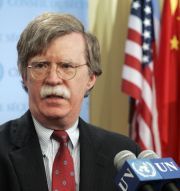Security Council deeply divided over Darfur peace sanctions
Feb 28, 2006 (UNITED NATIONS) — Despite stepped-up calls for sanctions against Sudanese blocking peace in conflict-wracked Darfur, the U.N. Security Council remained deeply divided on imposing any punitive measures.
 U.S. Ambassador John Bolton, on Monday, the next to last day of the U.S. presidency of the council, held a closed-door meeting to discuss a report by a U.N.-appointed panel that recommended sanctions against key figures from all groups involved in the Darfur fighting.
U.S. Ambassador John Bolton, on Monday, the next to last day of the U.S. presidency of the council, held a closed-door meeting to discuss a report by a U.N.-appointed panel that recommended sanctions against key figures from all groups involved in the Darfur fighting.
Most of the 15-member council were in favor of sanctions, led by the United States, Britain, France and Denmark — but Qatar, China, and Russia were strongly opposed, council diplomats said Monday.
The council heard a report from Greece’s U.N. Ambassador Adamantios Vassilakis, who chairs the sanctions committee on Sudan. The committee — which includes all 15 council members — “does not agree with the recommendations” of the panel and did not even get to the point of discussing its list, and other lists, of people who might be subject to sanctions, he said.
Bolton told reporters after the meeting that some committee members, whom he didn’t name, do not agree with the recommendations for sanctions. But he said “it will be not very far from now” that the council will have to make a decision.
A Security Council resolution adopted in March 2005 authorized an asset freeze and travel ban on individuals who defy peace efforts, violate international human rights law, or are responsible for military overflights in Darfur — and the panel was asked to come up with recommendations. The resolution also authorized the panel to help monitor an arms embargo in Darfur that was expanded to include the government as well as the rebels in an attempt to end the conflict.
An estimated 180,000 people have died in Darfur and some 2 million have been displaced since decades of tribal clashes over land and water erupted into large-scale violence in early 2003. Rebels from Darfur’s ethnic African population revolted, accusing the Arab-dominated government in Khartoum of discrimination and decades of neglect. The Sudanese government is widely alleged to have unleashed Arab militias who carried out sweeping atrocities against ethnic African villagers.
The report by the four-member panel included a confidential list of names to the Security Council committee of its recommendations for sanctions. Bolton expressed the council’s concern that some names — which included individuals from all the parties involved in the conflict — had been published in the media.
Qatar, China and Russia are now insisting that the sanctions committee establish criteria to determine who should be subject to sanctions, which some supporters view as a delaying tactic, council diplomats said, speaking on condition of anonymity because the meeting was closed.
Qatar is the only Arab member of the council, China is a major buyer of Sudanese oil, and Russia traditionally opposes sanctions.
Sanctions committee experts were scheduled to meet informally on Tuesday but no progress was expected.
Bolton said he told the council that it should mean what it says — and carry out its resolutions.
“If the council doesn’t mean what it says and isn’t willing to take steps to persuade people to follow what it says, its credibility will decline,” he said. “People need to consider that consequence.”
In Washington, State Department spokesman Adam Ereli refused to discuss any names, but said Bolton “is 100 percent right” — if resolutions are violated and “sanctions are applicable, then actions should be taken.”
This month, the United States also failed to get council approval for a U.N. peacekeeping force to replace African Union troops now deployed in Darfur. Many council members want to wait for a formal request from the African Union, which is scheduled to meet on March 3.
(AP/ST)
